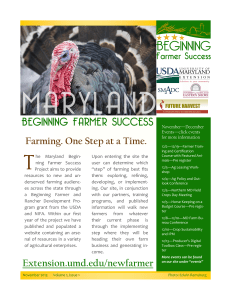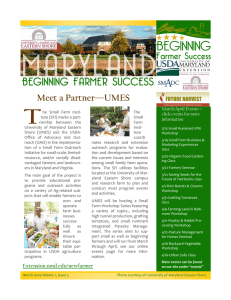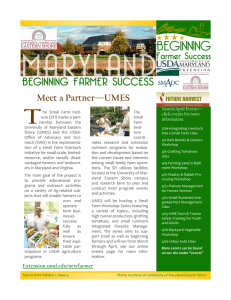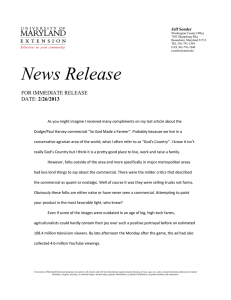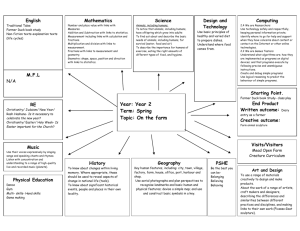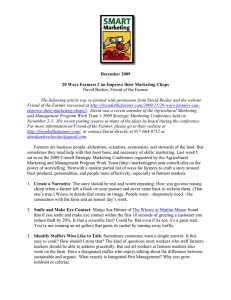Maryland Beginning Farmer Success Program Results
advertisement
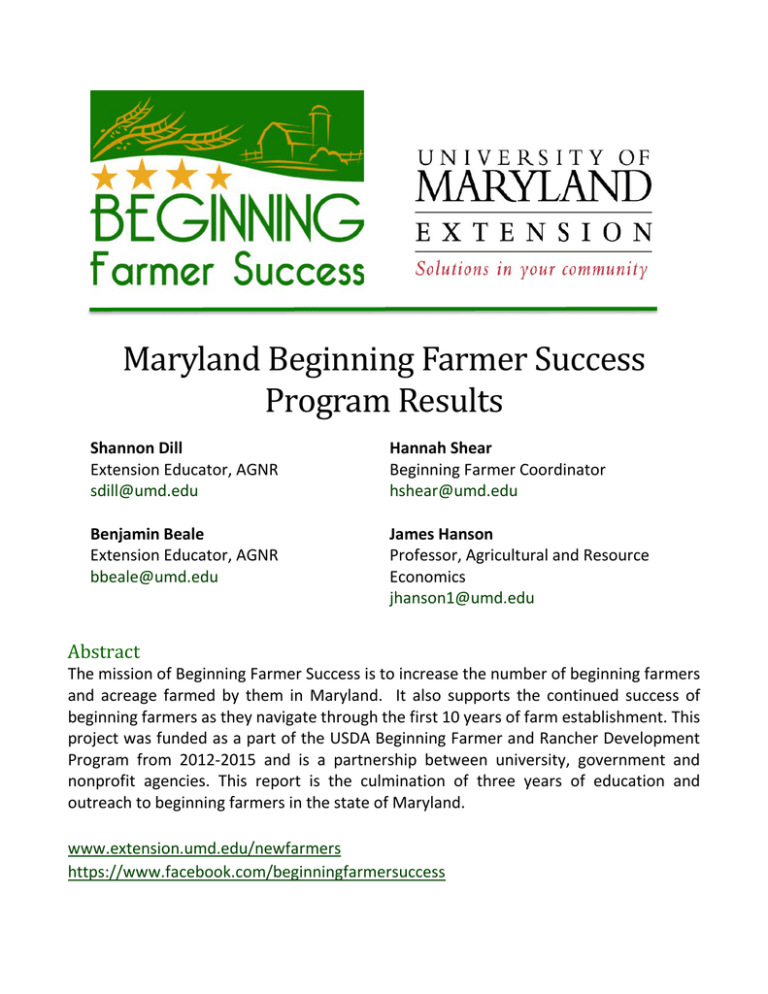
Maryland Beginning Farmer Success Program Results Shannon Dill Extension Educator, AGNR sdill@umd.edu Hannah Shear Beginning Farmer Coordinator hshear@umd.edu Benjamin Beale Extension Educator, AGNR bbeale@umd.edu James Hanson Professor, Agricultural and Resource Economics jhanson1@umd.edu Abstract The mission of Beginning Farmer Success is to increase the number of beginning farmers and acreage farmed by them in Maryland. It also supports the continued success of beginning farmers as they navigate through the first 10 years of farm establishment. This project was funded as a part of the USDA Beginning Farmer and Rancher Development Program from 2012-2015 and is a partnership between university, government and nonprofit agencies. This report is the culmination of three years of education and outreach to beginning farmers in the state of Maryland. www.extension.umd.edu/newfarmers https://www.facebook.com/beginningfarmersuccess Introduction In 2012 the University of Maryland was awarded an USDA Beginning Farmer and Rancher Development Project grant to educate and support beginning farmers of Maryland by providing a comprehensive education program that includes workshops, coaching, mentoring and on-farm training. The project brings together the University of Maryland College Park, University of Maryland Eastern Shore, the Southern Maryland Agriculture Development Commission and Future Harvest: A Chesapeake Alliance for Sustainable Agriculture (FH-CASA) as partners in education and outreach. A decrease in the number of farmers nationwide coupled with an aging farm population and the realization that beginning farmers need support in order to contribute to the food supply led to the development of the Maryland Collaborative for Beginning Farmer Success (BFS). The BFS program formally launched in 2012 and began creating educational opportunities for beginning farmers in the state. Since then numerous efforts have been made to create meaningful workshops and hands on trainings. As the program was planned a comprehensive evaluation process was included to measure knowledge gained and implemented on the farm. Methods An evaluation plan was established at the beginning of the project and included participants engaged, end of class evaluation and a three year follow up evaluation. End of class evaluations were conducted at the conclusion of educational events to discover knowledge gained and intentions following the class. In August of 2015, a final evaluation was conducted to determine specific actions taken as a result of beginning farmer programs. These questions required respondents to utilize a likert scale, rankings, and a comment section where applicable. The process and survey was reviewed and approved by the UMD Internal Review Board (UMD IRB #443446-3). Beginning Farmers Engaged Beginning farmers have been engaged in this project from a variety of sources. Over a three year period the number of beginning farmers reached includes: 2,855 Beginning Farmer Participants at Workshops and Conferences 25,600 Website Visits www.extension.umd.edu/newfarmer 11,400 Videos Viewed 250 Social Media Interactions 756 FarmLink Properties 65 Mentor Relationships 22 On-Farm Apprenticeships 2|Page End of Class Results Through conferences and workshops beginning farmers were able to explore farming options, understand the components of a successful farm operation, and make decisions about what enterprises best fit their interest. This was achieved through the development of specific curriculum combined with experiential learning designed for new farmers. An increase in knowledge was accomplished with participants reporting: • 93% learning what resources and agencies are available to start a farm, • 79% learning about agriculture and livestock in Maryland, • 84% learning how to market their farm business, • 80% learning about farm regulation and policies, • 88% learning about best management practices and conservation • 76% learning how to write a farm business plan, • 86% learning about soil productivity and fertility End of class evaluations also wanted to measure intentions and change as a result of beginning farmer education events. Participants were asked what they plan to do as a result of education received. Respondents reported: • 88% would start their own farm business, • 82% would write a farm business plan, • 74% would develop farm financial statements and enterprise budgets, • 82% would create goals and a farm production plan, • 85% would start crop enterprises. Follow Up Survey Results As the grant concluded it was important to measure outcomes and impacts of education events and activities. The evaluation was comprised of participants in past events or programs and clientele who voluntarily registered to receive monthly newsletters and other information from the website. The follow up survey was administered to 336 contacts of the project and 27% response. Participants of the survey reported what they have accomplished as a result of education received using a four point scale. Participants have built their business by: • Increasing my farm profitability (3.68), • Growing products for market (3.62), • Selling my product (3.55). • 18 participants that responded have purchased or rented land, • 24 participants that responded have started a farm enterprise, • 32 participants that responded have started their business. In the area of farm management participants report: • Researching agriculture crops and livestock in Maryland (3.48), • Writing a Farm Business Plan (3.46), • Contacting resources and agencies to start your farm business (3.39). 3|Page In the area of crop production participants report: • Practicing nutrient management on the farm (3.67), • Increasing soil productivity and fertility (3.66), • Practicing integrated pest management on the farm (3.65), • Implementing good agricultural practices and food safety (3.63). In the area of livestock management: • Implementing small ruminant management (4.25), • Using a rotational grazing system (4.22), • Using good pasture management techniques (4.20). Increase in farm profitability is a long term goal for beginning farmers. When asked if "what was learned has increased profitability", 31% responded yes (53% were unsure). Those that responded yes estimated an increase profitability from $525 to $1,048 per participant. Comments “It is a fantastic program and I hope to continue being involved with the program for a long time to come. I'm very grateful for the opportunity to be paired with farmer mentors. The knowledge they provided continues to be invaluable.” “Interested in starting, but it's been slow coming.” “We are working toward making formal plans, I appreciate the newsletters and information. It is helpful for us to feel informed and give us resources to investigate and make plans to begin our "adventure."” Discussion The past three years working with Beginning Farmers has been a very rewarding experience for all partners involved. There is a clear need for outreach and education and the skills to get started and be successful. This project embodied that goal from the classroom to field and the web to land. This team will continue to collaborate on Beginning Farmer programs to increase the number of successful farmers in the State of Maryland. Acknowledgements This project was supported by the Beginning Farmer and Rancher Development Program of the National Institute of Food and Agriculture, USDA, Grant #2010-49400-21719. Any opinions, findings, conclusions, or recommendations expressed in this publication are those of the author and do not necessarily reflect the view of the U.S. Department of Agriculture. 4|Page
